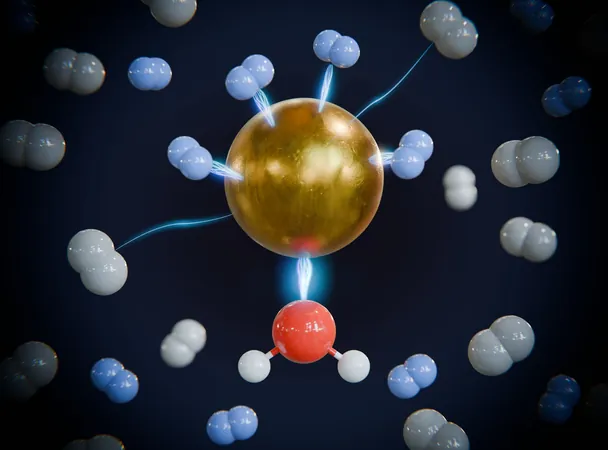
Groundbreaking Discovery in Hydrogen Research: Room Temperature Isotope Separation is Closer Than Ever!
2024-09-19
Author: Ming
Introduction
In a remarkable advancement in hydrogen research, a collaborative team from Leipzig University and TU Dresden, part of the Hydrogen Isotopes 1,2,3H Research Training Group, has made a significant breakthrough in the efficient and cost-effective separation of hydrogen isotopes. This development is crucial as hydrogen, being the lightest and most abundant element in the universe, is increasingly recognized for its potential role in the global energy transition towards sustainability.
The Importance of Hydrogen Isotopes
The research, recently published in *Chemical Science*, focuses on the three natural forms of hydrogen: protium (hydrogen-1), deuterium (heavy hydrogen), and tritium. Protium is the most abundant, while deuterium's applications have expanded, particularly in pharmaceuticals, where it contributes to the development of more stable and effective drugs. Tritium, when combined with deuterium, forms "super-heavy" hydrogen, which has garnered attention as a promising fuel source for future nuclear fusion technologies—considered the Holy Grail of clean energy.
Challenges in Isotope Separation
Historically, separating these isotopes has posed numerous challenges due to their nearly indistinguishable physical properties, making current methods inefficient and energy-intensive. Conventional isotope separation techniques require extreme low temperatures, around -200 degrees Celsius, which are not practical for large-scale industrial applications.
The Breakthrough
Professor Knut Asmis from Leipzig University explains, “While porous metal-organic frameworks have shown potential for isotope separation, achieving this at room temperature has remained elusive.” This research marks a pivotal shift, promising a future where high-purity hydrogen isotopes can be provided more sustainably and economically.
Research Insights
A key aspect of the team's research highlights the role of the framework environment in binding selectivity—essentially, understanding why one isotope may adhere better than the other. This intricate study, conducted by Ph.D. candidates Elvira Dongmo, Shabnam Haque, and Florian Kreuter, employs cutting-edge spectroscopy, quantum chemical calculations, and chemical binding analysis.
Future Implications
“For the first time, we’ve illustrated how individual atoms within these framework compounds influence adsorption. This discovery opens the door for the targeted optimization of materials, enhancing selectivity for isotope separation at room temperature,” noted Professor Thomas Heine from TU Dresden.
Conclusion
The implications of this research could revolutionize the hydrogen supply chain and enable broad-scale applications in various industries, from energy production to pharmaceuticals. As the world pushes for greener and more sustainable technologies, the efficient separation of hydrogen isotopes could play a pivotal role in shaping our energy future. Stay tuned as this innovative research unfolds, potentially paving the way for a new era in hydrogen energy!




 Brasil (PT)
Brasil (PT)
 Canada (EN)
Canada (EN)
 Chile (ES)
Chile (ES)
 Česko (CS)
Česko (CS)
 대한민국 (KO)
대한민국 (KO)
 España (ES)
España (ES)
 France (FR)
France (FR)
 Hong Kong (EN)
Hong Kong (EN)
 Italia (IT)
Italia (IT)
 日本 (JA)
日本 (JA)
 Magyarország (HU)
Magyarország (HU)
 Norge (NO)
Norge (NO)
 Polska (PL)
Polska (PL)
 Schweiz (DE)
Schweiz (DE)
 Singapore (EN)
Singapore (EN)
 Sverige (SV)
Sverige (SV)
 Suomi (FI)
Suomi (FI)
 Türkiye (TR)
Türkiye (TR)
 الإمارات العربية المتحدة (AR)
الإمارات العربية المتحدة (AR)